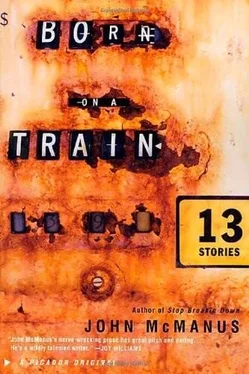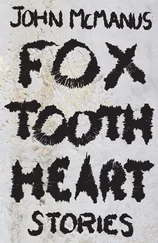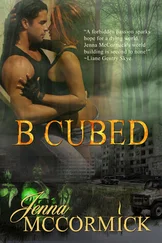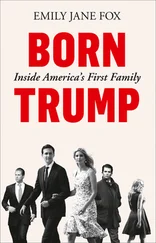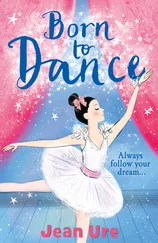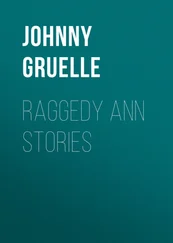Never leave your post. That’s so important.
He twisted two rusty screws into their holes. When he lifted the old plate up to pitch it away, Sam opened his mouth and grabbed his father’s arm. He wanted to keep the plate, but the air was too cold for him to talk. He wondered if fallout could keep his throat from making words. His father offered him the dirty piece of metal, but he didn’t let go when Sam tried to take it. You’ll be responsible, he said. You can’t let them see it.
I won’t, said Sam.
Dead or alive, his father said. Keep it out of sight.
Sam tucked the plate beneath his shirt. Its cold chill bumps rubbed against his own chill bumps. When he was in the car again, he hid the plate beneath the rug at his feet.
What’s it like in Mississippi? he asked when they were driving again.
It’s brown, his father said. It smells bad.
What smells bad?
The land. The open space.
But why? Sam said.
If everybody’s evil in a place, and they’re always thinking evil things about how to take stuff away from people, then it starts to smell bad.
The land does?
Uh-huh.
Like the grass and the dirt and things?
Pretty much the same things as here, said his father.
Why did we move up here then?
There are things you can’t do down in Mississippi.
Let’s just be quiet for a few minutes and enjoy the scenery, said his mother.
Sam wondered if his eyes would begin to hurt from the glow. You couldn’t mix things with black, but shivery streaks of pink were lighting the sky like frozen fire, even though black wasn’t a color. It was happening in the north, above the tree line where they were headed, and the ribbons of it looked to Sam like sevens. A great many of them had formed now toward Oak Ridge, all manner of sevens, streaks of lavender on a bed of darker pink.
Can I tell you how much money’s in the bag?
Of course you can, his mother said.
Because you said not to talk.
She turned and touched his leg and said, I meant about Mississippi.
It’s three hundred twelve dollars, said Sam.
His parents looked at each other and didn’t say anything.
Is that enough? said Sam.
Enough for what?
For what you need it for, said Sam.
When his mother turned to the window, Sam watched her to make sure she wasn’t going to cry, but then he looked away. You couldn’t just sit and watch your mother cry. He wondered if she’d cried this much when she was pregnant with him. He knew he’d counted the money right, but he counted again anyway, because he wanted her to like the number.
Let’s play a car game, his father said. I Spy, or Riddle Me, or what do you call it.
Don’t look at me while you drive, his mother said. We’ll wreck.
I’m not looking at you.
Good, she said.
That’s good? he said.
Don’t get sensitive if you know what I mean.
Sam could feel his father’s anger as they raced around the curves. He was gripping the wheel with callused thumbs. All the other cars had disappeared from the planet; their Chevette was the last one. It made Sam feel lucky, because there were so many people. He felt his fingers preparing for the radiation. If he grew an extra one, he wanted it on his left hand. His mother giggled and then coughed and said, I didn’t mean to do that, so don’t go basing anything on it, and Sam imagined her locked in an asylum, saw the whiteness of its walls and felt how hot he was and rolled his window down and pushed his head outside into the wind and felt the frigid world breathing and choking with him as he breathed.
Get back in here, his mother said. You’ll smash your head on a road sign.
Sam felt like he’d been sitting in the car for all his memory. He started counting as he rebuckled his safety belt, and he decided to count until everything ended. If he counted to death he’d reach two billion, unless the fallout killed them early. His brother would count with him when he learned to count. His father was turning his head away from the road, and Sam wished he would quit turning his head, but his mother didn’t notice; she wasn’t moving. What if she was counting too; what if she’d been counting since he was born? What number was she on? It scared him as they sped along the highway. He wanted to be the one to have built those sharp curves. The drivers would wonder who’d built them, and he’d feel their wonder. His ears popped as he sputtered through the darkness like a season that was gone and so much shadowed space spread out beneath the fallout cloud, and his mother shuddered; maybe she was dying. In the movie the children had been first to die, but grown-ups had died too, and no babies had been born.
He wished his parents spoke another language, so he would never know what they were fighting about. He drew with his crayon to slow his breathing. The bag was already covered with sevens, and he looked inside it at the repeated ones and zeroes and serial numbers. There needed to be a seven-dollar bill. Seven was less than ten, but the money would be luckier after he renumbered it. It would buy lucky things.
Money will get devalued, his father was saying. After the war in Germany they had to fill a wheelbarrow full of money to buy a jug of milk.
Where’d they get enough money to fill wheelbarrows? said Sam.
Ask your mother. She’s the Nazi.
Sam wished she knew his father was just teasing her, and he wished his father would tease him instead. Her ears were twitching as she told him about school. How he should look forward to it, how it had a playground and a library. Just try to act like everybody else, she said. The way you walk. Your handwriting.
What about my handwriting? said Sam.
It looks too neat, she said.
But I want it to look right, he said.
The other kids won’t even know how to write yet, Sam’s father said.
They’ve got eyes, said his mother. They can see it.
Sam wasn’t supposed to want things to look neat or pretty. Mountains from a distance, weeping willow trees. His mother said I’m sorry and stretched back and pinched the skin on his lower back with her hands as she hugged him tight. If I weren’t scared of what would happen, I’d shoot them, she said, but it would only make things worse. They’d make fun of you because of me.
Mama, said Sam, you’re not making any sense.
I didn’t even want to have a baby, because the world is so terrible. I knew the baby would grow up and hate the world too.
But I don’t hate the world, said Sam.
I know. I’m just telling you a story about what I thought.
Your mother likes to try to talk herself out of things, said his father.
What are you trying to talk yourself out of? said Sam.
Nothing, said his mother, and the force of the word made Sam shudder. He wondered if his brother would hate the world when he was born. He’d probably be a Pisces, and his mother was worried about that. Sam hoped she could hold him inside long enough for Aries to begin. He imagined his brother’s mind changing inside her like the numbers and pictures on a slot machine until she finally picked the right month.
I didn’t want to be this way, she said. That’s why people stay confused their whole lives, because the parents say confusing things the whole time they’re a kid.
I’m not confused, said Sam’s father. I know exactly why I hate the world.
You want this to be a bomb?
It doesn’t matter what I want.
Sam, your father wants us all to die.
As opposed to just one of us.
Sam hoped it was sarcasm, but he didn’t know how to tell. As he changed the money into sevens, he drew crooked lines and pointed them different ways and different sizes like clouds. The rosy shadows in the sky weren’t really clouds, because clouds were made of rain.
Читать дальше
